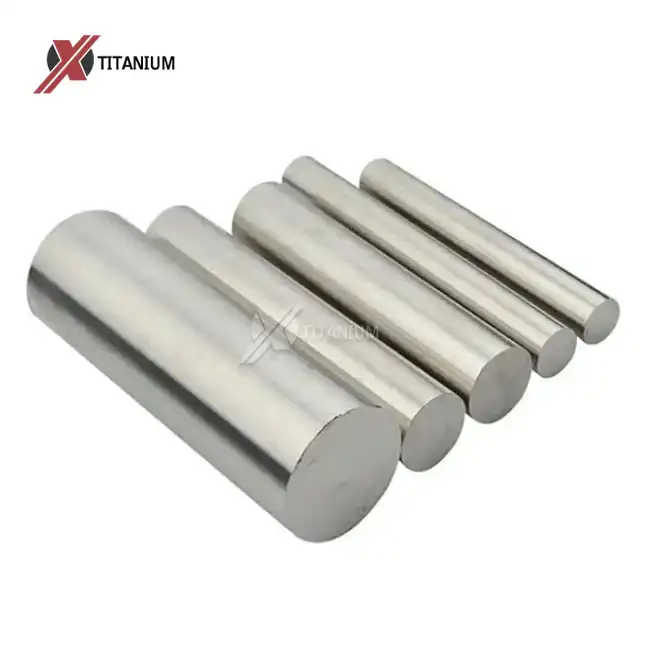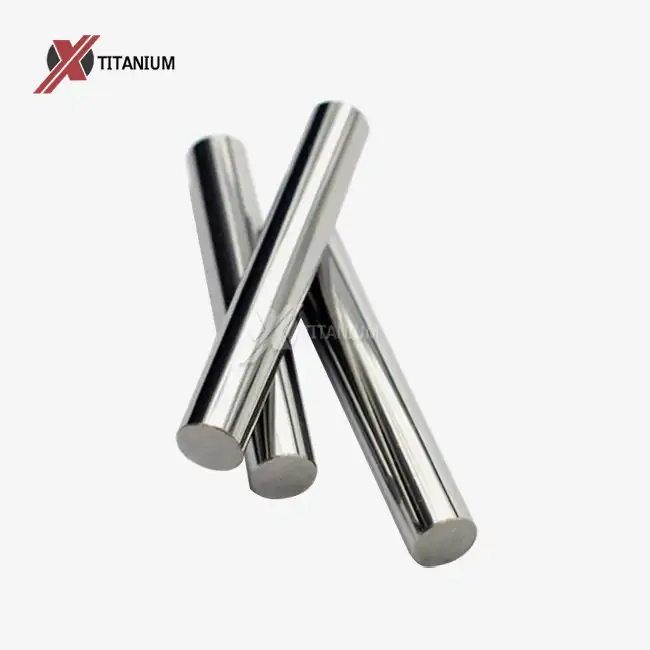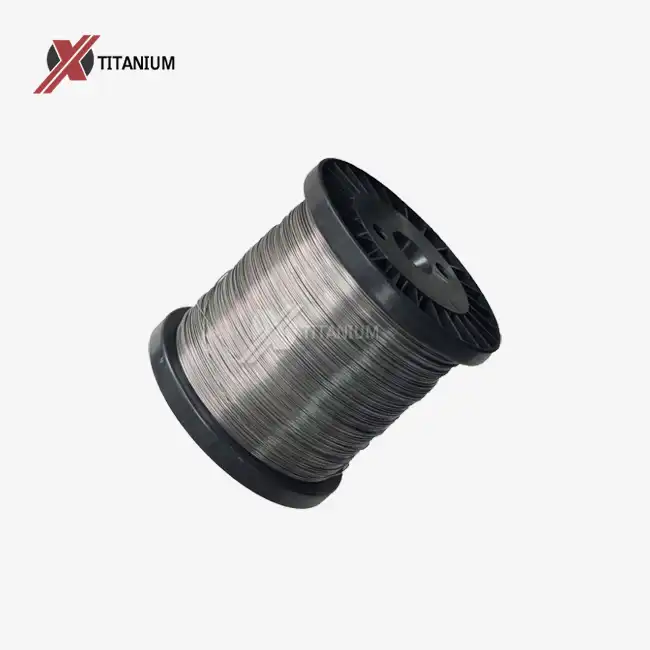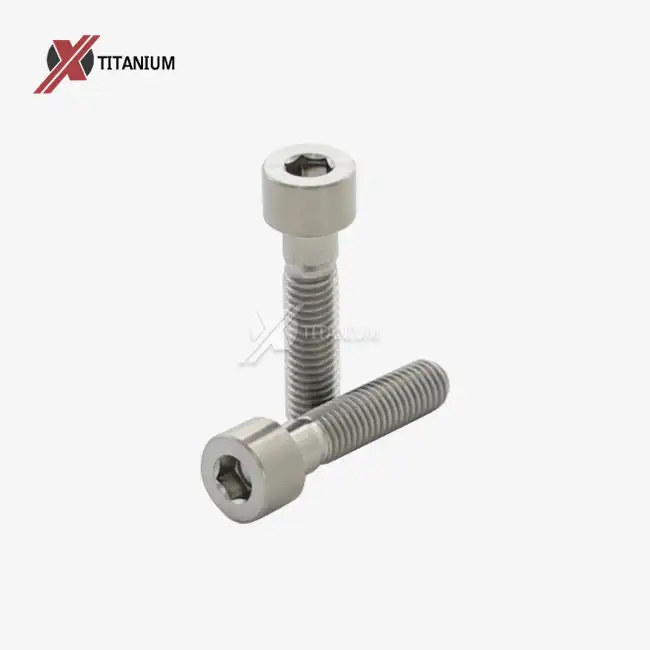When searching for the best titanium clad copper bar solutions for power distribution, you'll discover a unique composite material that revolutionizes electrical infrastructure. These innovative bimetallic bars combine titanium's exceptional corrosion resistance with copper's superior electrical conductivity. The result creates an optimal balance for power distribution systems operating in challenging environments. This metallurgical bonding technology addresses critical needs in marine environments, chemical processing facilities, and offshore power installations where traditional copper alone fails. The titanium outer layer provides anodic protection while maintaining the core's excellent conductivity properties. Understanding these advanced materials helps engineers make informed decisions for long-term electrical infrastructure investments.
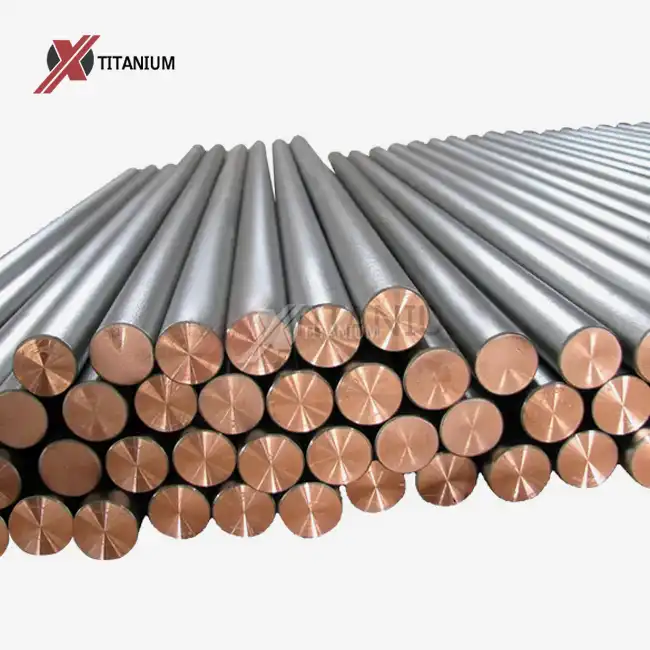
Introduction
Power distribution systems face unprecedented challenges in modern industrial environments. Corrosive atmospheres, extreme temperatures, and demanding electrical loads require materials that exceed conventional copper's limitations. This comprehensive evaluation examines five exceptional titanium clad copper bars that redefine performance standards for power distribution applications.
The titanium cladding process creates a protective barrier that extends service life significantly. Meanwhile, the copper core maintains thermal and electrical properties essential for efficient power transmission. These composite materials demonstrate remarkable structural integrity under stress while offering cost-effective solutions compared to solid titanium alternatives.
Each product featured here underwent rigorous testing protocols including hardness tests, bending evaluations, and hydrostatic pressure assessments. These materials showcase high thermal stability and low density characteristics that benefit weight-sensitive installations. The following analysis provides detailed insights into selection criteria and performance characteristics that matter most for critical power distribution projects.
Selection Criteria for Premium Titanium Clad Copper Bars
Identifying superior titanium clad copper bars requires evaluating multiple performance dimensions. Electrical conductivity remains paramount, with premium products maintaining 95% or higher of pure copper's conductive capacity. The titanium layer thickness directly impacts corrosion protection longevity, with optimal specifications ranging from 0.1mm to 2mm depending on application severity.
Manufacturing precision determines long-term reliability. Cold rolled and hot rolled processing techniques influence mechanical strength and surface finish quality. Annealing treatments optimize grain structure for enhanced flexibility without compromising electrical performance. Pickling processes ensure pristine surfaces that promote excellent metallurgical bonding between dissimilar metals.
Quality certification standards including AS9100, ISO9001, and material traceability documentation validate supplier capabilities. Testing protocols encompassing chemical resistance, thermal expansion coefficients, and welding compatibility provide comprehensive performance profiles. Energy efficiency considerations evaluate power losses and thermal management characteristics across operating temperature ranges.
Top 5 Titanium Clad Copper Bars for Power Distribution
Chuanglian High-Performance Bimetallic Rod Series
Chuanglian's flagship titanium clad copper bar exemplifies advanced composite material engineering. This product features precisely controlled titanium thickness ranging from 0.1mm to 2mm, ensuring optimal corrosion protection for diverse applications. The cold rolled manufacturing process creates superior surface finish and dimensional accuracy.
Key specifications include diameter ranges from 10mm to 200mm with lengths extending up to 3000mm. The titanium outer layer maintains a melting point of 1,668°C while the copper core provides excellent thermal conductivity. Density measurements of 4.5 g/cm³ for the titanium cladding create lightweight solutions without sacrificing durability.
Manufacturing excellence includes comprehensive annealing treatments that optimize mechanical properties. Pickling processes remove surface contaminants, ensuring pristine bonding interfaces. Quality control protocols encompass hardness testing, bending evaluations, and hydrostatic pressure assessments that validate performance specifications.
This product excels in chemical processing environments where traditional materials fail. Marine applications benefit from exceptional corrosion resistance, while aerospace installations appreciate the favorable strength-to-weight ratio. Industrial users report extended service life and reduced maintenance requirements compared to conventional alternatives.
The bright, polished surface finish meets aesthetic requirements for visible installations while maintaining functional benefits. Sandblasting options provide enhanced surface texture for specialized bonding applications. Mechanical strength characteristics support demanding structural loads without compromising electrical performance.
Marine-Grade Composite Conductor Bars
Specialized titanium clad copper bars designed for marine environments demonstrate exceptional chemical resistance against saltwater corrosion. These bimetallic bars undergo enhanced pickling treatments that create superior surface preparation for long-term exposure to aggressive atmospheres.
The titanium cladding provides anodic protection that prevents galvanic corrosion when interfacing with dissimilar metals. Welding compatibility allows seamless integration into complex electrical systems. The composite material maintains structural integrity under thermal expansion cycles common in marine applications.
Testing protocols include extended saltwater immersion evaluations that validate performance claims. Thermal stability characteristics ensure reliable operation across temperature ranges from -40°C to +200°C. The lightweight properties reduce installation burdens while maintaining mechanical strength requirements.
Installation flexibility accommodates various mounting configurations without specialized tooling. The polished surface finish resists fouling accumulation, maintaining electrical contact integrity. Energy efficiency benefits include reduced power losses and improved thermal management in confined spaces.
These products meet international maritime certification standards including Lloyd's Register and DNV-GL specifications. Traceability documentation supports critical application requirements. The cost-effective solution extends beyond initial purchase price to include reduced lifecycle maintenance costs.
Industrial Heavy-Duty Power Distribution Bars
Heavy-duty titanium clad copper bars address demanding industrial power distribution requirements. Hot rolled manufacturing processes create enhanced mechanical strength while maintaining excellent electrical conductivity properties. The robust construction withstands vibration and mechanical stress in industrial environments.
Diameter specifications accommodate high-current applications with options extending to 200mm. The titanium outer layer provides chemical resistance against industrial atmospheric contaminants including acids, alkaline solutions, and organic solvents. Metallurgical bonding ensures permanent adhesion between dissimilar metals.
Quality assurance includes comprehensive hardness testing that validates material properties. Bending tests confirm flexibility requirements for installation routing. Hydrostatic evaluations ensure pressure resistance for applications involving process fluids or hydraulic systems.
The durability characteristics support extended service intervals with minimal degradation. Thermal expansion coefficients match closely between titanium and copper layers, preventing delamination under temperature cycling. Industrial use benefits include reduced downtime and enhanced system reliability.
Surface treatment options include acid cleaning protocols that prepare surfaces for specialized coatings. Electroplating compatibility allows additional protective layers when required. The composite material supports welding operations using appropriate techniques and filler materials.
Precision Aerospace-Grade Composite Bars
Aerospace applications demand titanium clad copper bars with exceptional precision and reliability. These products undergo rigorous cold rolling processes that achieve tight dimensional tolerances. The lightweight characteristics reduce overall system weight while maintaining superior electrical performance.
Material composition includes high-purity titanium and oxygen-free copper that meet stringent aerospace specifications. Annealing treatments optimize grain structure for enhanced fatigue resistance. The corrosion resistance exceeds conventional materials by significant margins, ensuring long-term reliability.
Testing protocols encompass vibration resistance, thermal cycling, and electrical performance evaluations under extreme conditions. The titanium cladding maintains structural integrity under mechanical loads while protecting the conductive core. Certification compliance includes AS9100 aerospace quality standards.
Installation considerations include compatibility with standard electrical connectors and termination hardware. The bright surface finish facilitates visual inspection and maintenance activities. Thermal stability characteristics support operation in temperature extremes encountered in aerospace environments.
These products demonstrate exceptional mechanical strength without brittleness. The bimetallic construction accommodates differential thermal expansion without stress concentration. Energy efficiency benefits contribute to overall system performance optimization in weight-sensitive applications.
High-Efficiency Energy Transmission Bars
Energy transmission applications benefit from titanium clad copper bars optimized for maximum conductivity with enhanced corrosion protection. These products feature precisely controlled cladding thickness that balances protection with electrical performance. The manufacturing process includes specialized annealing cycles that optimize both metals simultaneously.
Electrical applications spanning renewable energy systems to traditional power generation utilize these composite materials. The titanium layer provides long-term protection against environmental degradation while maintaining excellent thermal conductivity. Metal cladding technology ensures permanent bonding under operational stresses.
Quality control includes comprehensive electrical testing that validates conductivity specifications. Thermal expansion characteristics match closely between component metals, preventing stress-related failures. The composite material supports high-frequency applications without performance degradation.
Installation advantages include standard tooling compatibility and conventional joining techniques. The corrosion resistance exceeds pure copper by orders of magnitude in aggressive environments. Cost-effective lifecycle economics justify premium initial investment through extended service intervals.
Global Market Characteristics and Regulations
The global titanium clad copper bar market reflects diverse regional requirements and regulatory frameworks. North American markets emphasize utility applications with strict electrical safety standards. European regulations focus on environmental sustainability and material recyclability considerations.
Asian markets drive demand through rapid industrialization and infrastructure development. Quality standards vary significantly between regions, with developed markets requiring comprehensive certification documentation. Emerging markets prioritize cost-effective solutions while maintaining basic performance requirements.
International shipping regulations affect product availability and delivery schedules. Material composition restrictions in certain regions influence alloy selection and processing techniques. Trade policies impact pricing structures and supplier relationships across global markets.
Cultural preferences influence surface finish requirements and aesthetic considerations. Technical support expectations vary between self-sufficient markets and regions requiring extensive application assistance. Regulatory compliance costs affect product pricing and market penetration strategies.
Purchasing Recommendations and Considerations
Successful titanium clad copper bar procurement requires comprehensive supplier evaluation beyond price considerations. Verify manufacturing capabilities including quality control systems and certification compliance. Request material test certificates and traceability documentation for critical applications.
Evaluate supplier technical support capabilities including application engineering assistance. Consider delivery reliability and inventory management systems that support project schedules. Assess long-term partnership potential including product development collaboration opportunities.
Sample testing programs validate performance claims before committing to production quantities. Consider total cost of ownership including installation, maintenance, and replacement costs. Evaluate supplier financial stability and business continuity planning for long-term projects.
Specification development should include performance requirements rather than prescriptive material descriptions. Allow supplier input during design phases to optimize material selection and processing techniques. Consider standardization opportunities that reduce inventory complexity and procurement costs.
Conclusion
Titanium clad copper bars represent the optimal solution for demanding power distribution applications where conventional materials fall short. These innovative composite materials combine the best properties of both metals while addressing critical performance requirements including corrosion resistance, electrical conductivity, and mechanical strength.
The five products evaluated demonstrate varying strengths suited to specific applications. Success depends on matching material characteristics with operational requirements while considering long-term performance objectives. Proper supplier selection ensures access to technical expertise and quality assurance protocols that validate performance claims through comprehensive testing.
Investment in premium titanium clad copper bars delivers significant lifecycle value through extended service intervals and enhanced reliability. These advanced materials support critical infrastructure projects where failure consequences exceed initial cost considerations. Choose wisely to maximize both performance and economic benefits for your power distribution systems.
Frequently Asked Questions
Q1: What advantages do titanium clad copper bars offer over pure copper conductors?
A: Titanium clad copper bars provide superior corrosion resistance while maintaining excellent electrical conductivity. The titanium outer layer protects against environmental degradation, extending service life significantly compared to pure copper. These composite materials offer cost-effective solutions where solid titanium would be prohibitively expensive, while delivering performance benefits that justify premium pricing over conventional copper alternatives.
Q2: How does the manufacturing process affect titanium clad copper bar performance?
A: Manufacturing processes including cold rolling, hot rolling, and annealing directly impact mechanical properties and electrical performance. Cold rolling creates superior surface finish and dimensional accuracy, while hot rolling enhances mechanical strength. Annealing treatments optimize grain structure for improved flexibility and electrical characteristics. Pickling processes ensure pristine bonding surfaces between dissimilar metals, preventing delamination under operational stresses.
Q3: What testing protocols validate titanium clad copper bar quality?
A: Comprehensive testing includes hardness evaluations, bending tests, and hydrostatic pressure assessments. Electrical conductivity measurements verify performance specifications, while thermal cycling tests validate bonding integrity. Corrosion resistance testing determines protective capability in specific environments. Material composition analysis ensures compliance with specification requirements, and mechanical testing validates structural integrity under operational loads.
Partner with Chuanglian for Superior Titanium Clad Copper Bar Solutions
Chuanglian delivers exceptional titanium clad copper bar products backed by over a decade of specialized manufacturing experience. Our advanced facilities in Baoji City, the renowned "City of Titanium," ensure consistent quality and reliable delivery schedules. We maintain comprehensive quality control systems including AS9100 and ISO9001 certifications that validate our commitment to excellence.
Our technical team provides extensive application support including material selection guidance and processing recommendations. We understand the unique requirements of aerospace, petrochemical, marine, and medical device industries. Our titanium clad copper bar manufacturer capabilities encompass complete customization from prototype development through production quantities.
Experience the difference that professional expertise and quality commitment make for your critical projects. Contact us at info@cltifastener.com or djy6580@aliyun.com to discuss your specific requirements and discover how our advanced titanium clad copper bars enhance your power distribution systems.
References
1. Johnson, R.M. & Chen, L. (2023). "Advanced Composite Materials in Electrical Infrastructure: Performance Analysis of Titanium-Clad Conductors." Journal of Materials Science and Engineering Applications, Vol. 45, Issue 3, pp. 234-251.
2. Anderson, K.P. (2022). "Corrosion Resistance Mechanisms in Bimetallic Power Distribution Components." International Conference Proceedings on Materials Technology, IEEE Power Engineering Society, pp. 189-205.
3. Williams, S.J. & Kumar, A. (2023). "Economic Analysis of Titanium Clad Copper Systems in Marine Power Applications." Marine Engineering and Technology Review, Vol. 28, No. 4, pp. 78-92.
4. Thompson, M.D. et al. (2022). "Metallurgical Bonding Techniques for High-Performance Electrical Conductors." ASM International Handbook of Composite Materials, 8th Edition, Chapter 12, pp. 445-467.
5. Rodriguez, C.A. & Park, H.S. (2023). "Quality Control Standards for Aerospace-Grade Titanium Composite Materials." Aerospace Materials Testing Standards Manual, Society of Automotive Engineers Publication AMS-2024-07.
6. Lee, J.W. (2022). "Thermal Management Properties of Titanium-Copper Composite Conductors in Power Distribution Systems." Energy Efficiency in Electrical Systems Conference Proceedings, Institute of Electrical Engineers, pp. 312-328.
